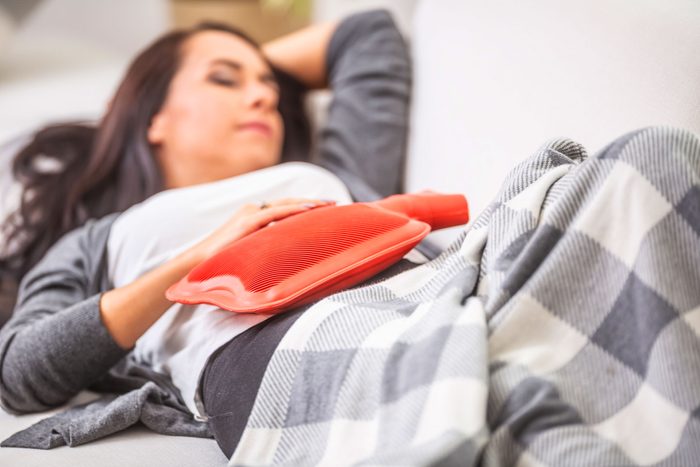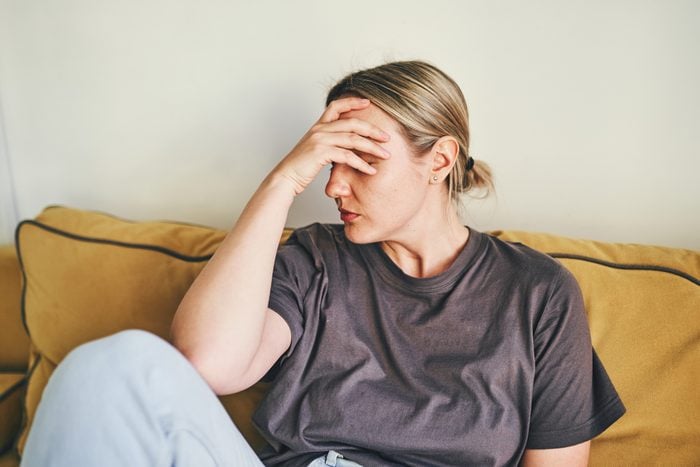
An intense headache, fierce cramps, relentless bloating, maybe even that initial flow showing up a few days early or late: If your period feels different in January, your observation is likely on-point. As a board-certified holistic nutritionist and women’s health coach I’ve noticed a trend over the years: My clients share that their January period is heavier with symptoms like more cramps, breast tenderness and irritability.
I’ve discussed this with other hormone experts who have noticed this in their practices, too. “Many of my patients report heavier, more painful periods in January after the holiday season,” shares naturopathic doctor Dr. Lara Briden, ND, author of The Period Repair Manual.
While there are no published studies specifically focused on the severity of women’s periods in January, research has been conducted to uncover the contributing factors that might cause worse periods in January than at other times of the year. Here’s what women’s health practitioners revealed about the link.

1. Alcohol consumption
Drinking alcohol over the holidays affects your overall health, especially your endocrine system. As Dr. Briden says, “In my experience, it’s usually downstream from increased alcohol consumption over Christmas and New Year’s.”
“First,” she says, “alcohol impairs healthy estrogen clearance, which results in more total estrogen plus spikes of very high estrogen. And because of how estrogen increases the thickness of the uterine lining, more estrogen can lead to heavier and more painful periods. Higher estrogen throughout the cycle can also set women up for worsened ‘estrogen withdrawal’ at the end of the cycle, a key driver of some types of premenstrual mood symptoms.”
“The second way that alcohol is bad for periods is that it can increase histamine and mast cell activation—a type of inflammation that can cause or worsen headaches, anxiety, breast pain, and heavy periods,” Dr. Briden adds.
Kate Morton, MS, RD, a registered dietitian and owner of Funk It Wellness, shares that increased alcohol intake (six drinks or more per week) in the luteal phase (roughly the two weeks before your period) is associated with a decrease in fertility, which shows there may be a correlation in increased alcohol intake and the menstrual cycle.
Here’s What to Eat for Period Cravings, Say Women’s Nutrition Specialists

2. Sugar intake
All those extra sweet treats over the holidays may affect your period as well. Mariza Snyder, DC, adds that during the holidays, “you’re eating a lot of sugar, carbs, and ultra-processed foods, which are endocrine-disruptive and cause metabolic issues. By the time you reach January, your endocrine and reproductive system is way more off-balance than usual, which means PMS, bloating, mood swings and cramps are much worse.”
Morton adds: “We know that imbalanced blood sugar can lead to inflammation and cause more painful periods.” She references one 2021 study published in Human Reproduction, which showed that blood sugar seems to be more imbalanced in the luteal phase. “If you are in your luteal phase during the holidays and not prioritizing blood sugar balance this could lead to a more painful period experience,” Morton says. “My clients always report that they feel like their luteal phase is worse with more mood swings and fatigue, and that their period cramps are worse in the winter months—really, until spring comes around.”

3. Stress
Stress is always a contributing reason for period pain, and the turn of a new year delivers plenty, with hectic holiday travel, shopping lists, work deadlines and trying to settle into a normal routine amid school snow days and virus season.
A recent study at the University of Arkansas found that high levels of stress can delay or even suppress ovulation, leading to changes in the menstrual cycle.”This is very relevant if you are going to be in their follicular phase (the two weeks leading up to ovulation) during the holidays,” Morton says.
Want to Stop Stress? A New Study Found This Solution Was More Powerful Than Meditation

4. Dark hours
Another factor that may contribute to a shift in your cycle includes reduced sun and light exposure. Morton shared how one study found that FSH, an important hormone for ovulation, was lower during the winter months. This study did not look directly at period symptoms, but it does illustrate that hormones do seem to shift with the seasons.
“Notably, though, women in the Southern Hemisphere (who are in the middle of summer) can also experience difficult January periods,” Dr. Briden adds. Even so, the fatigue and low spirits that can feel common this time of year do tend to correlate with a lack of light in the Northern Hemisphere.

5. Low vitamin D
There are several studies, such as one from 2023, which have found that low vitamin D levels are associated with increased severity of menstrual cramps (dysmenorrhea) and premenstrual symptoms. It is also well known that vitamin D can be lower in the winter months, while vitamin D supplementation has been shown in certain studies to reduce the severity of these symptoms.
Even if you do experience a change in your period come the new year, it doesn’t necessarily mean that the rest of the year will follow suit. “When I’m working with patients to improve their periods, I often say, ‘Let’s not worry about your January period because it could be quite difficult and not a good indication of where you’re at with periods overall. Once you get back on track, your February and March periods should be much better,'” Dr. Briden says.
For more wellness updates, subscribe to The Healthy @Reader’s Digest newsletter and follow The Healthy on Facebook and Instagram. Keep reading:
